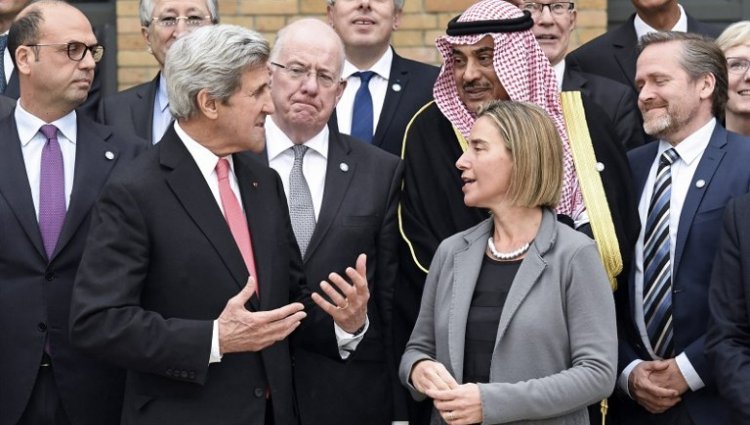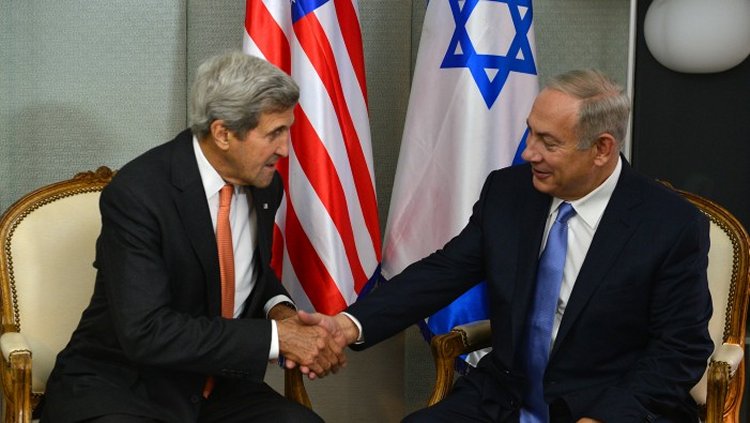 Outgoing US Secretary of State John Kerry (R) gestures as he speaks on the opening day of the World Economic Forum, on January 17, 2017, in Davos.(AFP PHOTO / FABRICE COFFRINI) |
 Outgoing US Secretary of State John Kerry (R) gestures as he speaks on the opening day of the World Economic Forum, on January 17, 2017, in Davos.(AFP PHOTO / FABRICE COFFRINI) |
Outgoing US Secretary of State John Kerry on Tuesday defended last-ditch Obama administration action against Israeli settlements, saying that it "really was important for us to make a statement and frankly ignite a debate. And I think that debate is now on."
Kerry appeared to be referring to Washington's decision to withhold its veto in the United Nations Security Council last month, allowing an anti-settlements resolution to pass, and a recent wide-ranging speech at the State Department skewering the settlements as a central obstacle to peace.
In an interview at the World Economic Forum in Davos, Kerry said Israeli policies on settlements are a "recipe for permanent insurgency, permanent conflict" with the Palestinians.
The interview — Kerry's last before the Friday inauguration of President-elect Donald Trump — came two days after a peace summit in Paris, during which the highest-ranking US diplomat called Prime Minister Benjamin Netanyahu to reassure him there would not be any followup action to the gathering of 70 countries and that Washington would oppose any further political action at the Security Council.
Kerry said Sunday that the United States had negotiated at the Paris summit to prevent Israel being treated unfairly. The conference ended with a mild joint declaration on both sides to keep the two-state solution alive, a formulation hailed by Israeli officials.
 US Secretary of State John Kerry (L) speaks with European Union Foreign Policy Chief Federica Mogherini (R) as they take part with other foreign ministers and representatives in a Mideast peace conference in Paris on January 15, 2017. (AFP PHOTO / POOL / bertrand GUAY) |
Netanyahu had unleashed a furious attack on the Obama administration after Resolution 2334 cleared the council. The prime minister has accused Washington of drafting and advancing the resolution, allegations the US administration has rejected.
Kerry on Tuesday reiterated his opposition to the settlements, accusing Israel of "eating up" large portions of the West Bank.
"We saw a process taking place whereby the West Bank is slowly and steadily being eaten up," Kerry told interviewer Thomas Friedman of The New York Times, "where municipal boundaries of settlements are being expanded, well beyond the settlement buildings themselves.
"Most of the West Bank has been reserved for the exclusive use of Israel. That's not a Palestinian state," he added.
As a result, "it really was important for us to make a statement and frankly ignite a debate. And I think that debate is now on," Kerry said.
 Prime Minister Benjamin Netanyahu meets with US Secretary Of State John Kerry in New York on September 23, 2016. (Kobi Gideon/GPO) |
Doubling down on his criticism of what he maintains is an emerging de facto binational state, Kerry continued: "Let me say to my friends in Israel: You cannot be a unitary state and be democratic and Jewish at the same time. You can't do it.
"That's a recipe for permanent insurgency, permanent conflict. And unfortunately, in the majority of the cabinet has already declared they don't believe in two states. But the majority of Israelis do believe in two states. The majority of American Jews believe in two states. And so all we're trying to do is preserve what is the broadly accepted remedy for this conflict, that has been accepted by people all over the world," he said.
Kerry said that as secretary of state, he had spent more than 300 hours talking to Netanyahu about peace. The two have had "real moments," Kerry said, adding that they considered each other "friends."
He said he warned Netanyahu that he was "changing the peace map," and "doing it unilaterally."
He recalled tell the prime minister that "if you continue to do that, you're going to have trouble also with us because our credibility is on the line. We can't say we're against settlements and then turn around and turn away from an effort to try and do something about it while you continue to build."
During the interview, Kerry also cast doubt on the administration of Donald Trump moving to quickly reverse some of the Obama administration's diplomatic achievements.
"I just don't believe" it, Kerry said.
If, for example, the Trump administration tried to dismantle the Iran nuclear agreement, Kerry said, he would bet that other countries that helped strike the deal would move to keep it, leaving the United States as "the odd person out."
"We'll have injured our own credibility," he said.